News & Media
New initiative aims to end GBV at SA universities
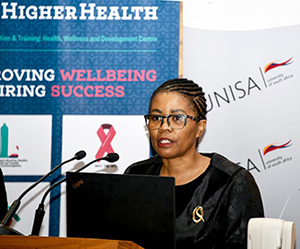
Prof Puleng Lenka-Bula, Unisa Principal and Vice-Chancellor
On Friday 27 August 2021, Unisa, in partnership with Higher Health and the Department of Higher Education, Science and Innovation, launched procedural guidelines on sexual and gender-related misconduct in post-school education and training (PSET) institutions in the Senate Hall in the Winnie Madikizela-Mandela Building. The guidelines include steps, checklists, minimum standards and controls that need to be in place to tackle gender-based violence (GBV).
By releasing a set of instruments, protocols and guidelines, this event supported the PSET GBV policy framework that Higher Education, Science and Innovation Minister Blade Nzimande launched in July 2020. The framework seeks to make it mandatory for all PSET institutions to raise awareness about GBV, prevent its occurrence and support survivors by having procedures for reporting and dealing with it.
The document released at the webinar launch will provide directives to institutions of higher learning to operationalise the necessary infrastructure for a comprehensive response to cases of sexual and gender misconduct, rape and sexual assaults.
Prof Ramneek Ahluwalia, Higher Health Chief Executive Officer (CEO), emphasised that the department became the first sector to come up with this higher education policy framework since President Cyril Ramaphosa launched the national strategic plan for GBV. He said after the launch of the framework the focus fell on how to make the policy into practical implementation to address GBV at higher learning institutions.
In her opening and welcome address, Prof Puleng LenkaBula, Unisa Principal and Vice-Chancellor, who is also the chairperson of the Higher Health GBV Technical Task Team, first acknowledged the pain society goes through when GBV becomes widespread, especially in institutions of higher learning. "Institutions of higher learning ought not to mimic what is in the society," she said. "I therefore hope that using well-researched knowledge can help to end GBV in South Africa (SA)."
Referring to the recent brutal killings of university students, LenkaBula highlighted femicide in the country by mentioning a student from the University of Cape Town (UCT), the late Uyinene Mrwetyana, who was murdered two years ago. She further said addressing sexual violence should also be tackled urgently.
Commenting on the culture of silence in the context of GBV, LenkaBula said that there should be no silencing or muting of voices for people speaking against the violence. "I strongly believe that higher learning institutions should create platforms that enable the reporting of sexual violence, sexual harassment and any acts that disable full participation of the marginalised groups," she said. "A culture of silence creates room for this terrible behaviour and violence. Creating platforms should be something that campuses allow for women and lesbian, gay, bisexual, transgender, gender diverse, intersex, queer, questioning and asexual (LGBTIQA+) communities."
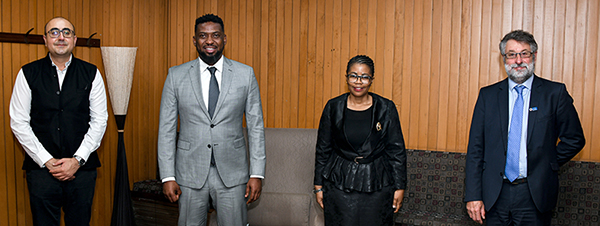
From left: Prof Ramneek Ahluwalia (Higher Health CEO), Buti Manamela (Higher Education Deputy Minister), Prof Puleng Lenka Bula (Unisa Principal and Vice-Chancellor) & European Union Ambassador
Deputy Minister of Higher Education, Science and Innovation, Buti Manamela, encouraged the audience to find ways to translate the mourning of GBV victims and legitimate rage into well-thought-out and transformative social and political activism. Manamela added: "As policy makers and activists, we are required to go beyond the sensational media headlines, populist political speak or hashtags, and think critically about the genesis and impact of violence against women, and its consequences for our nation and its future."
Speaking on lineaments of power, race and gender, the deputy minister further said: "Gender-based violence is a historical, systemic and structural problem and therefore, to fully understand it, we must also understand our country’s history of violence and the social violence in communities and households, in the form of the vulgar levels of poverty and inequality in our country. We must therefore understand that other grand forms of violence such as racism, capitalism and patriarchy shape and impact gender-based violence. It has now become common to refer to gender-based violence in South Africa as our own and long-standing pandemic. This reference to GBV is given validity by the crime data."
Furthermore, Manamela said: "This protocol must also be seen as a way of putting our GBV Framework for the PSET sector into practice. More practically, we see the protocol as empowering individual institutions with the required capacity to combat GBV and related forms violence within their jurisdiction. While this protocol may address the reality of individual institutions, the bigger reality that resides outside the walls of academic institutions is that the problem of GBV is a historical and societal phenomenon and not one that is confined to academic institutions."
In conclusion, Manamela explained that, like many of our nation’s pressing social problems, the problem of GBV is multifaceted and impacted upon by many social ills. "If we are to reduce and ultimately defeat the scourge of violence against women, one of our priorities should be to deliberately strengthen existing multi-sectoral partnerships. This is the only way we can guarantee an effective and comprehensive response against GBV," he said.
During the event, attendees observed a moment of silence for the recently murdered 23-year-old final-year law student, Nosicelo Mtebeni, of the University of Fort Hare.
* By Lesego Ravhudzulo, Journalist, Department of Institutional Advancement
Publish date: 2021-09-06 00:00:00.0


 Unisa improves its position in the Times Higher Education University Impact Rankings
Unisa improves its position in the Times Higher Education University Impact Rankings
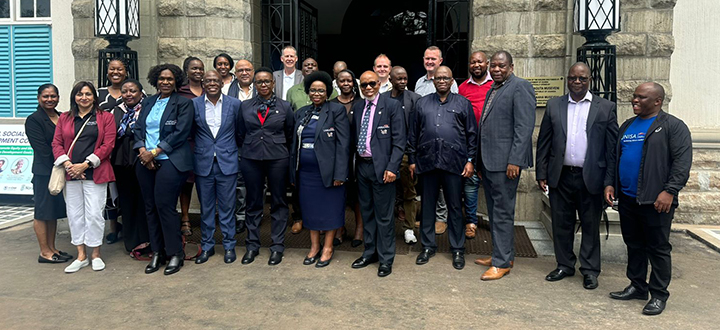 Unisa solidifies ties with Uganda’s largest university
Unisa solidifies ties with Uganda’s largest university
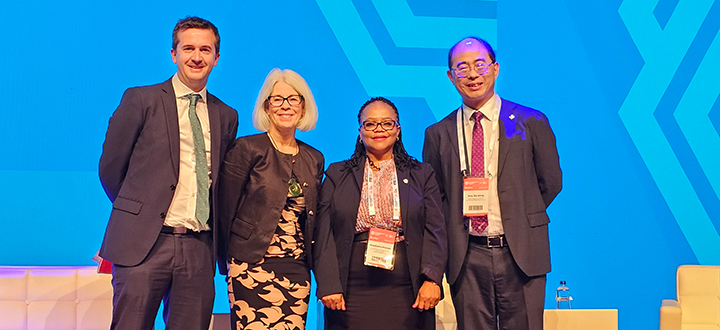 From Pretoria to Istanbul: Unisa makes its mark at Global SDG Congress
From Pretoria to Istanbul: Unisa makes its mark at Global SDG Congress
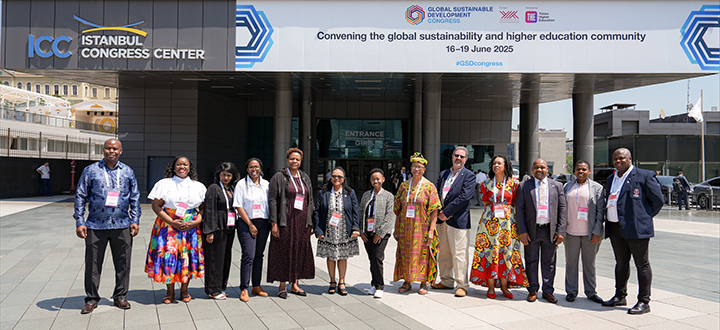 Unisa takes the global stage at sustainable development congress in Türkiye
Unisa takes the global stage at sustainable development congress in Türkiye
 Unisa rolls out major school digitisation initiative
Unisa rolls out major school digitisation initiative